|
|
|
Sort Order |
|
|
|
Items / Page
|
|
|
|
|
|
|
| Srl | Item |
| 1 |
ID:
127600
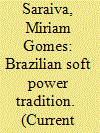

|
|
|
|
|
| Publication |
2014.
|
| Summary/Abstract |
Over the past decade, amid growing international fragmentation and declining US hegemony, Brazil has assertively expanded its participation in multilateral forums as part of a diplomatic strategy that envisions a reformulation of international institutions. At the same time, Brazil has also worked on building a leadership role within South America. These global and regional aims continue to shape the country's use of soft power. Indeed, soft power-defined by the political scientist Joseph S. Nye Jr. as influencing the behavior of others via attraction or persuasion rather than coercion or payment-is nothing new in Brazil's international dealings. Since the early 1900s, the nation has used such a strategy under different labels in conjunction with two beliefs central to its foreign policy: the need to build and assure Brazil's autonomy in its development strategy and foreign policy choices, and the desire to raise its global political profile
|
|
|
|
|
|
|
|
|
|
|
|
|
|
|
|
| 2 |
ID:
174437
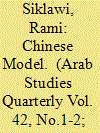

|
|
|
|
|
| Summary/Abstract |
This article is a reflection of the author's research visit to China in November 2019. It examines the growth and development of China and how this Chinese growth has challenged and reduced the US hegemony and supremacy in the world nowadays.
|
|
|
|
|
|
|
|
|
|
|
|
|
|
|
|
| 3 |
ID:
071663
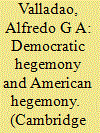

|
|
|
|
|
| Publication |
2006.
|
| Summary/Abstract |
The emergence of an 'American democratic empire', rising from the global informational and transportation revolution, that has its epicentre situated on the territory of the United States (US), has produced a profound metamorphosis in world affairs. National power elites, including those in America, are confronting a dilemma. They are compelled to accept, favour and even defend the so-called globalisation process in order to avoid further erosion of their economic and political power. On the other hand, this process is also directly threatening this same power. The paradox is that the US is the main promoter and defender of last resort of the new global 'order', which at the same time is restricting its own margins for sovereign action. The 'democratic empire' is thus fostering the rise of a democratic hegemonism at the expense of a 'US hegemonism'. This democratic hegemonism is a gradually rising-and fragile-consensus on a proliferating set of perceptions and values, stressing individual freedom, responsibility and political and social activism. This consensus arises from the material possibilities of a more individualistic way of life and the increasing capacity of single individuals or organised groups to participate in global and local political decision-making processes. This is a process that favours the empowerment of interest groups whose reference is no longer solely the nation-state. Hence, traditional power elites are progressively losing their ability to present themselves as the ultimate embodiment of a national 'general interest'. The irony of the seemingly intractable contradiction between US hegemonism and democratic hegemonism is that the actual spreading of the logic of the latter is closely dependent on US power and willingness to defend its own national interest. The greatest challenge for the coming decades will be the construction of supranational governance institutions under democratic hegemony, so as to avoid a classic imperial self-isolation of the US-a situation that would trigger the inevitable demise of democratic hegemonism and, for the time being, of any order as such.
|
|
|
|
|
|
|
|
|
|
|
|
|
|
|
|
| 4 |
ID:
118184
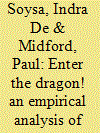

|
|
|
|
|
| Publication |
2012.
|
| Summary/Abstract |
The rise of China has led to a spate of scholarly and journalistic speculation about the future of a liberal world order. Apparently, the rise of a nondemocratic, Asian rival to US hegemony potentially undermines the growth of democracy throughout the system. Many see a resource-hungry China engaging itself globally out of purely self-interested motives, and Chinese business and aid offer a viable alternative to Western influence. Using the Stockholm Institute for Peace Research's (SIPRI) data on arms transfers since the end of the Cold War, we test the proposition empirically by assessing the nature and strength of Chinese politico-military support, measured as conventional arms transfers, globally and to African regimes. In short, we find that China relative to the United States transfers greater amounts of arms to democracies rather than autocracies, whereas the United States seems to prefer more autocratic regimes, despite rhetoric that claims an ethical foreign policy. The same result holds when we assess this relationship using human rights data. Moreover, Chinese arms transfers to countries suffering civil wars are much lower than the United States'. The findings are robust to the inclusion of several control variables and alternative estimation techniques. The findings show that popular perceptions about China's role in Africa do not match reality, particularly when assessed against the current hegemon's behavior.
|
|
|
|
|
|
|
|
|
|
|
|
|
|
|
|
| 5 |
ID:
176614
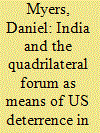

|
|
|
|
|
| Summary/Abstract |
In the Indo-Pacific, China is waging a well-orchestrated campaign to displace
US hegemony and secure a favorable balance of power. Driven by ardent nationalistic goals, the Chinese Communist Party is silencing political outliers and challenging the boundaries of international sovereignty. The first half of this article
outlines Chinese political ambitions and domestic civil rights violations levied in
pursuit of the government’s agenda. It then addresses how Chinese territorialism
in the South China Sea has undermined the utility of bilateral US strategic partnerships. The second half of the article describes the threat China poses to India’s
national security and why the Indian Air Force is particularly unprepared to meet
this challenge. The article concludes by suggesting a quadrilateral treaty alliance
between the United States, India, Japan, and Australia is needed to prevent further Chinese adventurism and preserve regional stability
|
|
|
|
|
|
|
|
|
|
|
|
|
|
|
|
| 6 |
ID:
174636
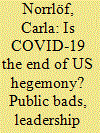

|
|
|
|
|
| Summary/Abstract |
COVID-19 is the most invasive global crisis in the postwar era, jeopardizing all dimensions of human activity. By theorizing COVID-19 as a public bad, I shed light on one of the great debates of the twentieth and twenty-first centuries regarding the relationship between the United States and liberal international order (LIO). Conceptualizing the pandemic as a public bad, I analyze its consequences for US hegemony. Unlike other international public bads and many of the most important public goods that make up the LIO, the COVID-19 public bad not only has some degree of rivalry but can be made partially excludable, transforming it into more of a club good. Domestically, I demonstrate how the failure to effectively manage the COVID-19 public bad has compromised America's ability to secure the health of its citizens and the domestic economy, the very foundations for its international leadership. These failures jeopardize US provision of other global public goods. Internationally, I show how the US has already used the crisis strategically to reinforce its opposition to free international movement while abandoning the primary international institution tasked with fighting the public bad, the World Health Organization (WHO). While the only area where the United States has exercised leadership is in the monetary sphere, I argue this feat is more consequential for maintaining hegemony. However, even monetary hegemony could be at risk if the pandemic continues to be mismanaged.
|
|
|
|
|
|
|
|
|
|
|
|
|
|
|
|
| 7 |
ID:
182597


|
|
|
|
|
| Summary/Abstract |
China has responded to criticisms of its handling of the COVID outbreak by an assertive foreign policy style referred to as ‘wolf-warrior diplomacy’. This study argues that this does not represent a radical shift in Chinese foreign policy but exacerbates a pre-existing trend. We say that this assertiveness builds upon the twin pillars of ‘core interests and the unambiguous exposition of the ‘striving for achievement’ policy adopted by China since Xi Jinping’s elevation as the President in 2012. We outline China’s response to its competition with the United States, based on heightened nationalism and practiced through centralised decision making.
|
|
|
|
|
|
|
|
|
|
|
|
|
|
|
|
| 8 |
ID:
113184
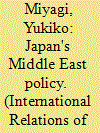

|
|
|
|
|
| Publication |
2012.
|
| Summary/Abstract |
Japan's vital interests, both its energy security and US alliance, are at stake in the Middle East. Change in Japan's Middle East policy is charted over three periods, from a stance independent of the United States to one increasingly aligned with US policy. This is explained in terms of four variables: level of US hegemony, threats in East Asia, energy vulnerabilities in the Middle East, and normative change inside Japan. Japan's policy in Middle East/North Africa reflects its general move toward a more militarily enhanced version of mercantile realism.
|
|
|
|
|
|
|
|
|
|
|
|
|
|
|
|
| 9 |
ID:
168922
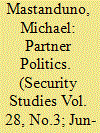

|
|
|
|
|
| Summary/Abstract |
Hegemonic-order theory draws attention to relationships of asymmetrical power and legitimate consent. This article emphasizes the importance of “lynchpin partnerships” in the maintenance of hegemonic order. The postwar US order relied on partnerships with Germany and Japan, and after the Cold War the United States sought to enlarge its hegemony by offering partner bargains to Russia and China. The terms of partnership differed significantly based on the relative significance of each state to the management of America’s hegemonic order. That order is now in jeopardy given that the partnership with Russia failed, while that with China succeeded for two decades but is now under considerable strain. The US experience suggests that hegemonic orders are easier to establish than to extend, and, since the dominant state controls the terms of entry, liberal hegemonic orders are easier for some states to join than for others.
|
|
|
|
|
|
|
|
|
|
|
|
|
|
|
|
| 10 |
ID:
131390
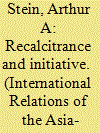

|
|
|
|
|
| Publication |
2014.
|
| Summary/Abstract |
This paper challenges the conventional wisdom that US power and preferences following World War II led to bilateralism in Asia and multilateralism in Western Europe. It argues that the challenges facing the United States in both regions were similar, as were US policies meant to address them. With some lag, the United States supported the economic recovery of the regional powers it had defeated (Germany and Japan), saw the restoration of regional trade as a prerequisite, sought military bases to assure postwar security, and envisioned rearming its former foes as part of its security strategy. The outcomes in the two regions reflected the preferences and reservations of regional actors. The critical differences between the regions were structural. The existence of middle powers was critical in Europe, the return of colonial powers to Asia precluded regional arrangements in the short term, and geostrategic differences shaped the requisites for regional security.
|
|
|
|
|
|
|
|
|
|
|
|
|
|
|
|
| 11 |
ID:
092088
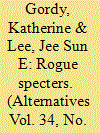

|
|
|
|
|
| Publication |
2009.
|
| Summary/Abstract |
The United States continues to label North Korea and Cuba "rogue states" of unique international distinction even though their economic, political, and military power has declined steadily since 1990. The authors argue that persistence of the label and accompanying US behavior is best understood by expanding upon a Schmittian frame of analysis to demonstrate that the designation of rogue state determines the normative weight given to certain behaviors, rather than the other way around. Examining the distinctive mode of politics practiced by North Korea and Cuba shows that they do pose threats to the United States, but not in the ways traditionally recognized by liberal states. Rather, through the anomalous role they play in the US-led system, their relentlessly polemical political discourse, and their excitable speech and ideological unmasking, they highlight the primacy of the political dimension determining their relationship with the United States and the contradictions underlying the universalism of US hegemony.
|
|
|
|
|
|
|
|
|
|
|
|
|
|
|
|
| 12 |
ID:
155436
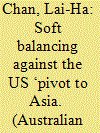

|
|
|
|
|
| Summary/Abstract |
The existing accounts about the China-led multilateral development bank—the Asian Infrastructure Investment Bank (AIIB)—have focused on the USA’s policy concerns and the economic and commercial reasons for China having established it. Two deeper questions are left unaddressed: Was there any strategic rationale for China to initiate a new multilateral development bank and, if so, how effective is China’s strategy? From a neorealist balance-of-power perspective, this article argues that China has felt threatened by the Obama administration’s rebalance to the Asia-Pacific strategy. In response, China is opting for a soft-balancing policy to carve out a regional security space in Eurasia in order to mitigate the threat coming from its east. China’s material power, premised on the fact that the country is a huge domestic market and flush with cash, has proved irresistible for Asian states, with the exception of Japan, to be enticed away from the USA. On the one hand, this article adds weight to the claim that although the USA remains the pre-eminent military power in the Asia-Pacific, it has fallen into a relative decline in regional economic governance; on the other, China’s soft balancing has its own limitations in forming like-minded partnerships with, and offering security guarantees to, AIIB members. A China-led regional order is yet to have arrived, even with the AIIB.
|
|
|
|
|
|
|
|
|
|
|
|
|
|
|
|
| 13 |
ID:
194352


|
|
|
|
|
| Summary/Abstract |
In a global economy and system increasingly defined by new developments and complexities in trade, whose rules and regulations govern that trade matter. The UK has embarked on a new post-Brexit trade policy, signing its first wholly new free trade agreements (FTAs) with Australia and New Zealand. It is also in negotiations to join the Comprehensive and Progressive Trans-Pacific Partnership (CPTPP) as part of the UK’s aspirations to become an integral part of the Asia-Pacific trading community. This study’s research and text analysis on the UK’s bilateral FTAs with Australia and New Zealand reveals high levels of similarity with two larger regional agreements heavily imprinted with US trade regulatory norms—this being the CPTPP itself and the United States–Mexico–Canada Agreement (USMCA). The UK’s revealed willingness to strongly align itself with US trade regulatory norms has important implications for the Asia-Pacific. It also raises some key issues on what kind of trade partner the region might expect a post-Brexit ‘Global Britain’ to become, and how the UK’s deeper planned engagement with the Asia-Pacific could affect its strategic dynamics. This could significantly depend on how closely the UK is pulled over time into the US’ trade regulatory orbit.
|
|
|
|
|
|
|
|
|
|
|
|
|
|
|
|
| 14 |
ID:
175840
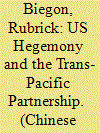

|
|
|
|
|
| Summary/Abstract |
This article provides a critical analysis of the agency of the United States in the Trans-Pacific Partnership (TPP). Building on neo-Gramscian theory, it contextualises the US decision to withdraw from the TPP as an expression of hegemonic crisis. Through an examination of the strategic and geoeconomic logics and objectives of the trade agreement in US foreign economic policy, it maintains that the TPP was intended primarily to expand the structural and consensual power of the United States in the international political economy. Partly an attempt to kick-start a stalled neoliberal agenda, the TPP was also an effort to respond to China’s growing influence in trade governance. The article argues that, despite the revival of the TPP in the form of the Comprehensive and Progressive Agreement for Trans-Pacific Partnership, the inability of elite networks in the United States to implement the original accord is illustrative of a crisis of hegemony driven largely by the collapse of the ‘common sense’ in favour of economic globalisation.
|
|
|
|
|
|
|
|
|
|
|
|
|
|
|
|
| 15 |
ID:
108103
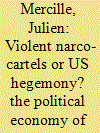

|
|
|
|
|
| Publication |
2011.
|
| Summary/Abstract |
Mainstream analysis and commentary on drug trafficking and related violence in Mexico focuses overwhelmingly on the narco-cartels as sources of the problem and presents the US as a well intentioned player helping to conduct a 'war on drugs' out of concern for addiction, crime and violence. This article offers an alternative interpretation, grounded in critical political economy, showing that in addition to fuelling the narcotics industry in Mexico thanks to its large drug consumption and loose firearms regulations, the US shares much responsibility for its expansion thanks to its record of support for some of the main players in the drugs trade, such as the Mexican government and military, and by implementing neoliberal reforms that have increased the size of the narcotics industry. The war on drugs has served as a pretext to intervene in Mexican affairs and to protect US hegemonic projects such as nafta, rather than as a genuine attack on drug problems. In particular, the drugs war has been used repeatedly to repress dissent and popular opposition to neoliberal policies in Mexico. Finally, US banks have increased their profits by laundering drug money from Mexico and elsewhere; the failure to implement tighter regulations testifies to the power of the financial community in the US.
|
|
|
|
|
|
|
|
|
|
|
|
|
|
|
|
| 16 |
ID:
120778
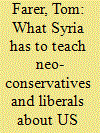

|
|
|
|
|
| Publication |
2013.
|
| Summary/Abstract |
The only means available to the US to assume a responsibility to protect the Syrian people from slaughter was by credibly threatening Bashar al-Assad and the security and military elite surrounding him with a decapitating air strike if they did not immediately cease murdering protestors and begin negotiations with opposition figures to the end of making the regime broadly representative of the Syrian population. Credibility probably demanded an initial decimation, a technically possible move. In part because the US lacks the ideology and institutional structure of a real imperial power, in part because it is post-Bush a careful calculator of national interests, Syria, unlike Libya but much like Sudan and the DRC, was a bridge too far.
|
|
|
|
|
|
|
|
|
|
|
|
|
|
|
|
|
|
|
|
|